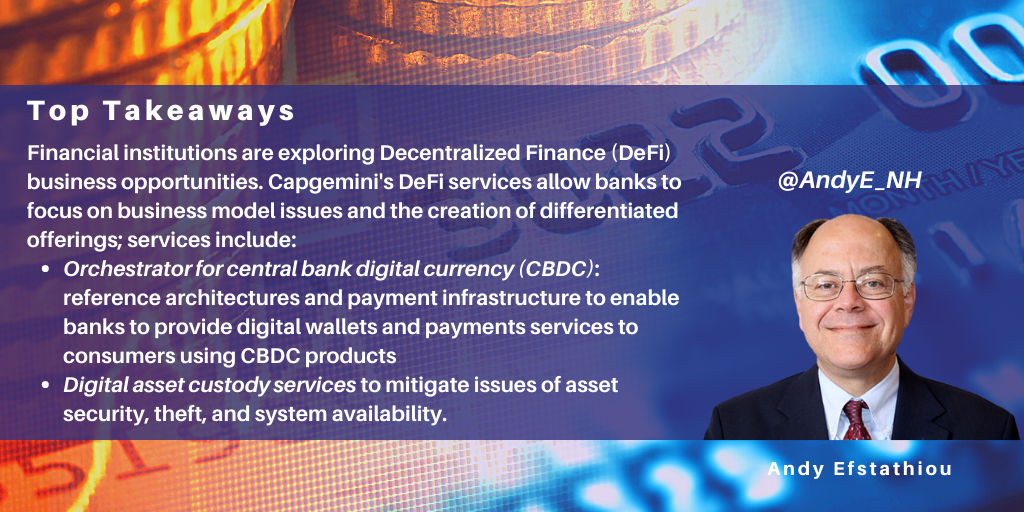Search posts by keywords:
Filter posts by author:
Related NEAT Reports
Other blog posts
posted on Mar 25, 2022 by Andy Efstathiou

Industry background
Financial services are very centralized, with exchanges, central banks, and custodians delivering platform-based services to any user who wants to make a financial transaction or own a financial asset/liability. Decentralized finance, DeFi, is a financial system built on distributed ledger technology (DLT or blockchain) that allows a user to transact and own without an intermediary or centralized principal.
DeFi is in its early days, so the exact outline of such a system and the benefits achievable is not yet certain, but increasingly investors, including incumbent financial institutions, are building DeFi POCs and operations. Key DeFi applications being developed include decentralized:
- Payments: cryptocurrency and central bank currencies (CBDC)
- Lending (peer-to-peer)
- Exchanges (digital assets including securities, financial instruments, and currencies)
- Contracts (trade finance)
- Digital assets and Non-Fungible Tokens (NFT).
Interest from financial institutions is growing rapidly, with over 80% of central banks considering the establishment of digital currencies and over 7k cryptocurrencies now in existence. The key question is: how can financial institutions explore and execute a strategy for building a DeFi set of offerings without diverting large sums from their existing business and at the same time reinventing the wheel?
Capgemini’s framework and approach
To address this emerging opportunity with its clients, Capgemini has developed a set of assets and capabilities. Key components of Capgemini’s DeFi capabilities include:
- Tech Radar: evaluates and provides a POV on emerging technologies. Currently, 300 items have been assessed for the DeFi domain
- Digital Asset offerings: integration services for the digital asset custody lifecycle
- Trusted Data Exchange: an accelerator that enables data exchange for blockchain technology
- Blockchain Garage: consultants who work with clients to identify use cases, develop POCs, or integrate blockchain technologies into legacy platforms
- Ecosystem partnerships: a partner ecosystem of product and platform vendors
- Academic research: applied research programs with academic institutions
- Thought leadership: Capgemini published thought leadership pieces to identify trends and Capgemini’s POV on DeFi opportunities and challenges.
Both the opportunity and the challenges for DeFi are very large. To make an impact on commercializing this emerging technology, Capgemini has decided to focus its efforts in two areas:
- Orchestrator for CBDC products: central bank digital currencies can provide payment capability to consumers who currently do not have access to the financial system (financial inclusion). It can also reduce the cost of cross-border transactions. Because digital currencies can embed code, they are programable to promote governmental goals. These currencies will need custodians to reduce consumer risk. This will likely be retail banks that will store the currency in digital wallets for consumers. Capgemini is building the capabilities and running the POCs with banks to support orchestrating and managing CDFCs. Examples of engagements to date include:
- Working with SWIFT to build CBDC integrations to enable cross-border, cross-digital currency payments
- Developed reference implementation of a decentralized crypto exchange
- Built a distributed trade finance platform for a trade finance industry participant
- Developed payments infrastructure for multiple central banks
- Digital asset custody: digital asset custody is necessary to address the issues of asset security, theft, and system availability. Large retail banks typically have internal teams working on setting up digital asset custody services. Capgemini is targeting all other types of retail banks with services including Consulting, Implementation and Operate. Capgemini has domain-specific custody IP in asset tokenization, asset transfer networks, digital wallets, on-chain settlements, security, lending, and reporting. Because time-to-market is critical in this fast-evolving market, middle-market banks are looking for pre-packaged solutions that can be configured and rapidly deployed.
Conclusions
The financial services industry currently operates on a highly centralized operating model. The model works well, but the centralized model has high cost and complexity. Cost and complexity effectively limit access to the industry to customers, vendors, and products that already have large financial resources. DeFi operates on a decentralized model using DLT technology to deliver service without intermediaries or centralized principals. DeFi offers the promise of lower cost and greater access for transacting and owning digital assets.
The scale and speed of the transition to a DeFi business model are very high, which requires vendors and banks looking to succeed to focus on a few opportunities and specialize in building a competitive advantage. At the same time, any initiative needs to be plugged into an ecosystem of FinTech vendors to provide infrastructure and context to each bank’s initiatives.
Capgemini has built, and is growing, an ecosystem of FinTech vendors for the DeFi opportunity, and has chosen to focus on two opportunities in the DeFi space (orchestrator for CBDC products and digital asset custody).
These mutually reinforcing opportunities position Capgemini to provide infrastructure services (both implementation and management) for individual banks’ initiatives. These offerings will allow banks to focus their efforts on business model issues and the creation of differentiated offerings for their markets. By reducing time-to-market for new DeFi offerings, banks should be able to create new businesses and attract new customers who have never participated in the financial services industry previously.
